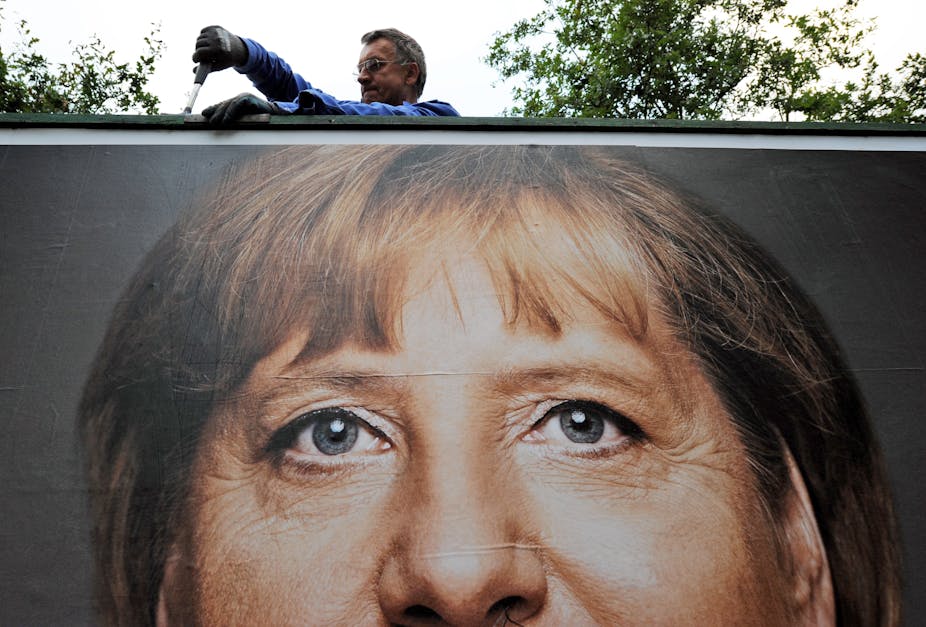Germany will go to the polls on September 24 to elect its next parliament – a vote which will determine whether Angela Merkel will hold onto her post as chancellor.
The election isn’t causing quite the same anxiety as unfolded in France ahead of the presidential contest there earlier this year, but it is nevertheless very significant. Merkel has led Germany for more than a decade. During that time she has come to occupy a central position among European leaders.
If she is replaced, it will shape the EU’s refugee policy, the ongoing Southern European debt crisis and possibly Brexit negotiations. And that’s just for starters.
Since voters do not directly elect the German leader, but only determine party shares, polls are not the best source to predict the next chancellor. Polls give us a good idea about which party will make it into parliament (parties have to secure at least 5% of the vote share to make it in at all) and which coalitions are possible, but they do not directly tell us which coalition will govern and who will be head of the government.
This is where prediction markets can be useful – both to predict the election outcome or to make money betting on it. A prediction market is a small, simple financial market where traders can buy and sell assets whose payoffs after the election depend on the election outcome.
So, for example, an asset might pay US$1 if Merkel remains as chancellor but nothing if she does not. This is the “Merkel asset”. There are other assets, most notably for main challenger Martin Schulz. The “Schulz asset” will pay US$1 if Schulz becomes the next chancellor, and nothing if he does not.
Similarly, there are assets for all other serious contenders plus an asset for the “all others” category. Buying an asset is similar to betting on the candidate – you make money if that candidate wins.
Who would you bet on?
Suppose you think that Merkel will remain chancellor, say with a subjective probability of 80%. If you are risk neutral, then you should buy the Merkel asset as long as its price does not exceed US$0.8. Why? Because in this case you expect a payment of US$1 with probability 80% (Merkel wins), and a payment of US$0 with probability 20% from holding the asset. Thus, any price exceeding 0.8 x US$1 + 0.2 x US$0 = $0.8 means you expect a net loss. (This calculation ignores possible transaction costs which depend on the platform.)

If many traders think an asset is underpriced, so that the winning probability is higher than the price, then they all buy and drive up the price. Prices therefore adjust, forming a market consensus forecast. And indeed, researchers have shown that this sort of market-based wisdom of the crowd has outperformed polls in forecasting US elections.
But how exactly can we turn prediction market prices into election forecasts? My colleague and I have shown that if a prediction market price is, say, US$0.7, then the underlying outcome indeed happens in 70% of the cases; if the price is US$0.8, then the outcome happens in 80% of the cases, and so on. Thus, the prices match the underlying probabilities, which we can use to forecast. Other studies confirmed that prediction market prices are “well calibrated” in this sense.
This finding does not mean that the favourite (the asset with the highest price) is guaranteed to win the election. It just means the favourite is most likely to win, and prediction markets exactly quantify the winning probabilities.
Who will be the next chancellor?
The price of the Merkel asset is currently US$0.90, indicating a 90% chance, so the markets predict that Merkel will very likely start her fourth term as German chancellor in September. Indeed, the price chart over time reveals that this forecast has not changed much in the past two months.

Early in May, traders were a bit more sceptical, pricing Merkel’s chances at around 70%. Mind you, that’s still a prospect most politicians dream of. Since then her chances improved even further.
Far behind, Schulz is currently priced at US$0.09, indicating a 9% chance at becoming the next chancellor. No other politician receives more than a 1% chance. Given these numbers, anything but a Merkel victory in September would be a huge surprise.

